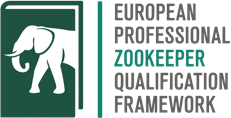“The first priority of managing a zoo is to keep the business running: zoo management has to ensure that the business is run properly and that visitors are attracted to the zoo. They also have to ensure that visitors have a pleasant time so they will think of coming back again.”
– The Modern Zoo: Foundations for Management and Development – EAZA
Managing a zoo requires balancing the provision of excellent animal management and care with an optimal visitor experience and quality customer service. In addition to standard business management practices, zoos also need to consider the extra element of collection planning. Although high level management tasks are not part of a zookeeper’s role, their work is directly influenced by zoo management decisions. Zoo management should promote organisational unity through a shared mission, goals, and organisational values. The zookeeper position is a key part of a zoo’s staffing structure, and it is good practice for zookeepers to have an overview of the management that takes place at higher levels of their organisation. This becomes more important for zookeepers working at higher levels, who may be filling job roles with higher levels of responsibility and complexity. Within this topic there are six competencies:
- Sustainable Practice: zookeepers are aware of the importance of sustainability in the zoo and follow sustainable practices in their daily work.
- Financing of Zoos: zookeepers can describe the funding model of their own zoo and how this compares with a broader picture across Europe.
- Collection Planning: zookeepers can describe the role of different species in the collection and how this relates to regional collection planning
- Organisational Structure and Functions: zookeepers understand the wide range of functions that are required to run a zoo.
- Ethics: zookeepers can describe how ethics applies to their role and can apply ethics in their decision making relative to their role.
- International Organisations: zookeepers can demonstrate awareness of the different organisations that govern and support the modern role of the zoos, including EAZA, WAZA and country and discipline specific organisations relevant to their role. They demonstrate knowledge of relevant working groups, forums and conferences relevant to their organisation.
| Zookeepers working at Competent level can: | Zookeepers working at Proficient level can: | Zookeepers working at Expert level can: | |
|---|---|---|---|
| 4.5.1 Sustainable Practice | Define the concept of sustainability Explain why sustainability is important in the zoo (If applicable) comply with institutional policies and practices as directed to in their daily work |
Describe (if applicable) their institution’s policy on sustainability and examples of how their institution is implementing (or planning to implement) sustainable practices Independently and proactively apply institutional policies and practice on sustainability in daily works (eg. reduce usage of energy and water in daily works, manage waste, etc.) Create safe items for animal enrichment from waste products (e.g. empty feed containers, timber) |
Review trends of sustainable practices and propose new sustainable initiatives to apply in their institution |
| 4.5.2 Financing of Zoos | Identify the funding model of their own zoo (e.g. charity, state funded, etc.) | Describe different funding models that may be applied in other European zoos, and their implication List major sources of income and expenditure for their zoo (e.g. visitor entrance fees, animal feed, etc.) |
Describe the impact of different funding models on the strategic functions of the zoo Explain the reasons for the relative allocation of sources of income and expenditure of their zoo |
| 4.5.3 Collection Planning | Demonstrate familiarity with their institutional collection plan (ICP) Describe the role that species they work with frequently have in the ICP |
Explain why collection planning is important for their institution | Make recommendations or suggest which species should be moved in and out of their institution according to the ICP Demonstrate familiarity with Regional Collection Plans (RCP) that apply to their work |
| 4.5.4 Organisational Structure and Functions | Describe fully their own role as a zookeeper. Outline their institution’s organisational structure and responsibilities of staff members. |
Describe how their role fits in a broader institutional context Describe fully the role of subordinates (if applicable) |
Conduct a succession planning exercise and identify ways to address any issues identified |
| 4.5.5 Ethics | Describe the content of ethics policies relevant to their work (e.g. institutional policies, EAZA code of ethics) Apply relevant ethics policies in their daily work |
Debate the differences between ethics and animal welfare Provide examples of how they integrate ethics into every aspect of their daily work |
Evaluate their work in an ethical context Justify their working practices in an ethical context Anticipate and solve ethical questions that arise in their work Participate in Ethics Committee (if applicable) |
| 4.5.6 International Organisations | Describe different levels of organisations involved in governing and supporting modern zoos: national associations (e.g. BIAZA, SAZA), regional associations (e.g. EAZA, ZAA), and global associations (WAZA). Name the organisations of which their institution is a member Identify other organisations involved in supporting zookeepers e.g. national, regional, and international zookeeper organisations (ABWAK, AFSA, ICZ) |
Explain the impact of external organisations on their institution and their work. Join appropriate organisations and groups to support their work Identify opportunities to contribute to international cooperation |
Actively participate in relevant working groups, forums and conferences (e.g. husbandry workshops, taxon specific events, specialist topic events (enrichment, animal training etc.) Report and share their experiences with colleagues and subordinates proactively |
Resources
- The Modern Zoo: Foundations for Management and Development – EAZA
- AZA-accredited Zoo and Aquarium Green Practices – AZA
- EAZA Code of Ethics – EAZA
- WAZA Code of Ethics and Animal Welfare – WAZA
- …
Paths to fulfilment
- EAZA Academy course ‘Introduction to Zoo and Aquarium Management’ – EAZA
- EAZA Academy course ‘Zoo and Aquarium Collection Planning’ – EAZA
- …
Last updated: 20/06/2018
